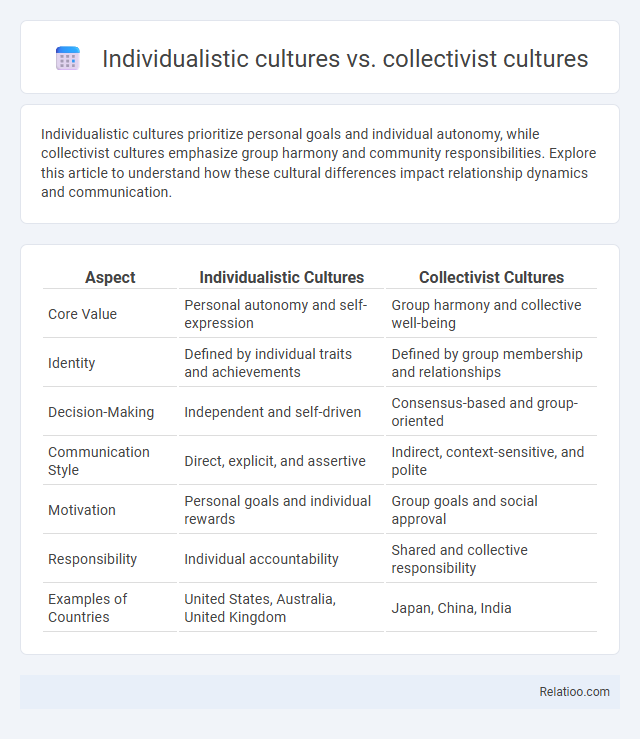Individualistic cultures prioritize personal goals and individual autonomy, while collectivist cultures emphasize group harmony and community responsibilities. Explore this article to understand how these cultural differences impact relationship dynamics and communication.
Table of Comparison
| Aspect | Individualistic Cultures | Collectivist Cultures |
|---|---|---|
| Core Value | Personal autonomy and self-expression | Group harmony and collective well-being |
| Identity | Defined by individual traits and achievements | Defined by group membership and relationships |
| Decision-Making | Independent and self-driven | Consensus-based and group-oriented |
| Communication Style | Direct, explicit, and assertive | Indirect, context-sensitive, and polite |
| Motivation | Personal goals and individual rewards | Group goals and social approval |
| Responsibility | Individual accountability | Shared and collective responsibility |
| Examples of Countries | United States, Australia, United Kingdom | Japan, China, India |
Defining Individualism and Collectivism
Individualistic cultures emphasize personal autonomy, self-expression, and individual achievements, prioritizing personal goals over group goals. Collectivist cultures focus on interconnectedness, social harmony, and group welfare, valuing collective goals and responsibilities above individual desires. Hospitality obligation varies, with individualistic cultures highlighting personal choice in hosting, while collectivist cultures emphasize social duties and reciprocity within community networks.
Core Values of Individualistic Societies
Individualistic cultures prioritize personal autonomy, self-expression, and individual rights, emphasizing the importance of personal achievement and independence. Core values in these societies include self-reliance, privacy, and the pursuit of personal goals, which often shape how hospitality obligations are perceived as personal choices rather than communal duties. Your understanding of hospitality in individualistic societies highlights voluntary generosity rather than mandated cultural expectations, contrasting with the collective responsibility seen in collectivist cultures.
Core Values of Collectivist Societies
Core values of collectivist societies emphasize group harmony, family ties, and community responsibility, shaping social behavior and decision-making. Hospitality obligation in these cultures often involves generosity and care extended beyond immediate family to visitors and neighbors, reflecting a collective commitment rather than individual preference. Understanding these principles helps you navigate social expectations and build meaningful relationships within collectivist contexts.
Communication Styles in Each Culture
Individualistic cultures prioritize direct and explicit communication, emphasizing personal opinions and individual achievements, while collectivist cultures favor indirect, context-sensitive communication that reinforces group harmony and relational obligations. Hospitality obligation in collectivist cultures often manifests through nonverbal cues and tacit understanding, reflecting a shared responsibility to nurture social bonds, whereas in individualistic cultures, hospitality is frequently expressed through explicit offers and verbal invitations. Recognizing these communication style differences is crucial for effective intercultural interactions, as it helps navigate expectations around expressing hospitality and maintaining social cohesion.
Family Structure and Social Relationships
Individualistic cultures emphasize personal autonomy and prioritize individual goals, often shaping family structures with a focus on nuclear families and independent social relationships. Collectivist cultures value group harmony and interdependence, promoting extended family networks and strong social bonds that encourage shared responsibilities. Your understanding of hospitality obligation varies as collectivist societies see it as a familial duty intertwined with social cohesion, while individualistic cultures may view hospitality as a personal choice rather than a collective expectation.
Workplace Dynamics and Leadership Approaches
Individualistic cultures prioritize personal achievement and autonomy, influencing workplace dynamics by encouraging independent decision-making and leadership styles that reward individual initiative and accountability. Collectivist cultures emphasize group harmony and collaboration, fostering leadership approaches centered on consensus-building, interpersonal relationships, and a strong sense of mutual obligation. Your leadership effectiveness depends on adapting to these cultural values, balancing personal ambition with communal responsibility to meet hospitality obligations and maintain cohesive workplace environments.
Attitudes Toward Success and Failure
Individualistic cultures often view success as a personal achievement and failure as an individual responsibility, emphasizing self-reliance and personal growth. Collectivist cultures interpret success as a reflection of group harmony and family honor, while failure may be seen as a communal setback requiring collective support and restoration of social balance. In hospitality obligations, individualistic societies prioritize personal autonomy even in social settings, whereas collectivist societies emphasize fulfilling social duties to maintain group cohesion and honor through attentive hospitality.
Conflict Resolution Strategies
Individualistic cultures prioritize personal autonomy and direct communication in conflict resolution, emphasizing self-expression and individual rights. Collectivist cultures focus on group harmony and indirect communication, often employing mediation and consensus-building to resolve disputes. Hospitality obligation in collectivist societies fosters a context where maintaining relationships and social cohesion guides conflict resolution strategies, promoting forgiveness and face-saving practices.
Impact on Education and Learning Styles
Individualistic cultures emphasize personal achievement and self-expression, encouraging students to engage in independent learning and critical thinking. Collectivist cultures prioritize group harmony and cooperation, fostering collaborative learning environments where students support each other's success. Your understanding of hospitality obligation in collectivist societies reveals an educational focus on respect, politeness, and social responsibility, shaping learning styles around communal values and interpersonal relationships.
Effects on Mental Health and Well-being
Individualistic cultures prioritize personal autonomy and self-expression, which often leads to increased self-esteem but can also result in feelings of isolation and anxiety due to reduced social support. Collectivist cultures emphasize group harmony and interdependence, providing strong social networks that protect against stress but may suppress individual identity and increase pressure to conform. Hospitality obligations in collectivist societies like extended family care and social reciprocity promote mental well-being through communal support but may also cause stress when social expectations become burdensome.

Infographic: Individualistic cultures vs Collectivist cultures
 relatioo.com
relatioo.com